For an upcoming edition of The International Journal of Press/Politics, Regina Lawrence [@lawrenceregina] reviews our book Retooling Politics: How Digital Media are Shaping Democracy. Gonzalo, Daniel, and I are very grateful for her thoughtful engagement with the book and her kind verdict:
A strength of Retooling Politics is how well and explicitly it combines theoretical perspectives and findings from across the fields of communication and political science. For example, the book offers equally well-developed chapters on digital media’s effects on individuals’ knowledge, attitudes, and political behaviors (Chapter 4) and on political organizations (Chapter 6). Each chapter leverages a broad swath of extant research to examine how fundamentally (or not) digital media are impacting politics. Chapter 4, for example, features an excellent discussion of the empirical hazards in rapidly proliferating research on various subgroups and micro-effects across an expanding array of digital platforms; of the Internet as increasingly a field of accidental, not just purposeful, exposure to political messages; and of misunderstandings about the extent of political polarization and the Internet’s role in it; capping off the chapter is a pages-long examination of the 2016 Cambridge Analytica story to show how fears and hype around psychometric targeting and voter manipulation were overblown.
Overall, Retooling Politics offers a simple and effective model for thinking systematically and cautiously about the effects of digital media on contemporary politics. It would be an excellent addition to advanced seminars in political communication. And it effectively primes the kinds of future research the authors want to see more of: That the fields of communication and political science combined “develop a sustained interest in communicative institutions, organizations, and practices” (p. 67) deeply grounded in decades of previous research from both fields and guided by a common sense and contingent model of the impacts of digital media.
